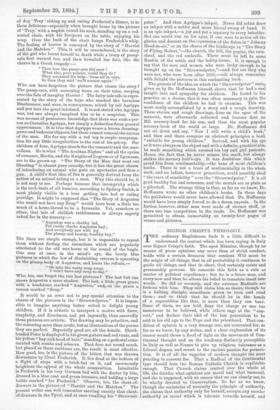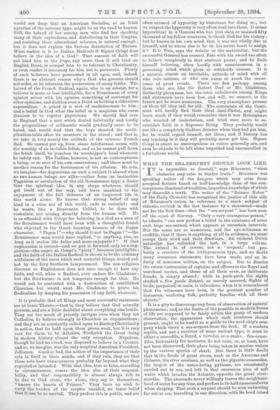SIGNOR CRISPI'S THEOLOGY.
THE ordinary Englishman finds it a little difficult to understand the contest which has been raging in Italy over Signor Crispi's faith. The aged Minister, though by no means of pious opinions any more than of strict conduct, holds with a certain firmness that sentient Will must be the origin of all things, that in all probability it continues to guide all things, and that in short, God certainly exists and presumably governs. He conceals this faith as a rule as matter of political expediency ; but he is a brave man, and every now and then he allows his belief to translate itself into words. He did so recently, and the extreme Radicals are furious with him. They still claim him as theirs, though he is a halting disciple, sometimes given to turn and rend them ; and to think that he should be in the bonds of a superstition like that, is more than they can bear. Some of them, we are told, deny the charge as one too monstrous to be believed, while others rage at the "con- vert," and declare their idol of the last generation to be sold in his old age to the Pope and the priesthood. That con- dition of opinion is a very strange one, not accounted for, so far as we know, by any writer, and a clear explanation of its causes would throw a flood of light on the movement of Con- tinental thought and on the tendency distinctly perceptible in Italy as well as France to give up religious tolerance as a Liberal dogma, and revert to the ancient passion for persecu- tion. It is of all the vagaries of modern thought the most puzzling to account for. That a Radical of the Continental type should hate the Roman Catholic Church is explicable enough. That Church claims control over the whole of life, she decides what opinions are moral and what immoral, and she is supposed, with no reason that we can clearly see, to be wholly devoted to Conservatism. So far as we know, though she maintains of necessity the principle of authority, she claims that authority only for herself, accepts any secular authority as moral which is tolerant towards herself, and would not deny that an American Socialist, or an Irish agrarian of the extreme type, might be on the road to heaven. Still, the hatred of her among men who find her checking many of their aspirations, and, disbelieving in their Utopias, and resisting their educational schemes, is natural enough ; but it does not explain the furious detestation of Theism. What matter is it to Italian Radicals if Signor Crispi does believe in the idea of a God? That amount of faith will not bind him to the Pope, any more than it will bind an English Deist, or compel him to be tolerant to Christianity, or even render it necessary for him not to persecute. Plenty of such believers have persecuted in all ages, and, indeed, there is no abstract reason why a God who governs should not order, as he tolerates, the persecution of many faiths. The hatred of the French Radical, again, who is an atheist, for a believer is more or less intelligible, for a Frenchman of every opinion mixes with his opinion something of contempt for other opinions, and dislikes even a Deist as holding a ridiculous superstition. A priest is a sort of medicine-man to him ; and a belief in God what the belief in a magician who cures diseases is to regular physicians. We should find even in England that a sect which denied habitually and loudly the propositions of arithmetic would gradually come to be hated, and would find that the boys shouted the multi- plication-table after its members in the street ; and that is, we take it, very nearly the attitude of the extreme French Red. He cannot put up, from sheer intellectual scorn, with the worship of an invisible fetish, and as he cannot pull down the fetish itself, he punches its worshipper's head, whenever he safely can. The Italian, however, is not so contemptuous a being, or so sure of his own conclusions ; and there must be another reason for the furiousness of his atheism. He acts, we imagine—for dogmatism on such a subject is absurd when no two human beings are alike—rather from an instinctive Paganism or secularism of the old Renaissance type, a desire that the spiritual idea, in any shape whatever, should get itself out of the way, and leave mankind to the enjoyment of the full richness of an improved life in this world alone. He knows that strong belief of any kind in a ruler not of this world, ends in restraint ; and he wants, like a Benvenuto Cellini, to be done with restraints, not arising directly from the human will. He is as offended with Crispi for believing in a God as a man of the Renaissance would have been with a thoughtful friend who objected to the Greek learning because of its Pagan character. "Pagan ! "—why should it not be Pagan? "—the Renaissance man would have replied, "or anything else, so long as it makes life fuller and more enjoyable " If that explanation is correct—and we put it forward only as a sug- gestion—the anger at Crispi's " piety " becomes intelligible ; and the faith of the Italian Radical is shown to be the ordinary wilfulness of the races which seek material things, heated red- hot by the fiery Southern temperament. The non-religious German or Englishman does not care enough to hate any faith, and will, when a Radical, even endure Mr. Gladstone ; but the Southerner is not temperate enough for that. He would not be contented with a destruction of established Churches, but would want Mr. Gladstone to prove his Radicalism by denying his possession of any faith whatever.
It is probable that all Kings and most successful statesmen are at heart Theists,—that is, they believe that God actually governs, and are a little doubtful about everything else beside. They see too much of priestly intrigue even when they are Catholics, to believe strongly in Churches as organisations; and they are so constantly called upon to disobey Christianity in action, that its hold upon them grows weak, but it is very rare for them to be Atheists, Frederick the Great being in modern history almost the only exception. Napoleon, though he had no creed, was disposed to believe in a Creator, and so, we imagine, was the only sceptical American President, Jefferson. Good or bad, the notion of the importance of their acts is fixed in their minds, and if they rule, they see that those acts have consequences probably far beyond what they expected or intended. With that idea, true or false, according to circumstances, comes the idea also of their responsi- bility, and that responsibility is almost always felt to be due to God alone, who alone, they say to themselves, "knows the hearts of Princes." They have no wish to carry the burden of the sceptre unaided, no inner belief that it can be so carried. They profess this in public, and are
often accused of hypocrisy by historians for doing so ; but we suspect the hypocrisy is very often read into them. It seems hypocritical in a General who has just slain or maimed fifty thousand of his fellow creatures, to thank God for his victory ; but he knows in his own mind that it was not wholly due to himself, and to whom else is he in his secret heart to assign it ? It is Fate, says the Asiatic or the materialist; but the successful General has crossed Fate with his sword too often to believe completely in that abstract power, and he finds himself believing, often hardly with consciousness, in a governing mind which gives or withholds success. It is a natural, almost an inevitable, attitude of mind with all who rule nations, or who can cause or avert the occur- rence of great events. There are few perhaps among them who are, like Sir Robert Peel or Mr. Gladstone, distinctly pious men, but the total unbelievers among Kings and statesmen have been few, and will, we suspect, in the future not be more numerous. The very atmosphere presses on them till they call for aid. The extremists of the Conti- nent will hardly find their ideal Anti-Christ, and might learn much if they would remember that it was Robespierre who wearied of materialism, and tried. once more to re- establish faith in a Supreme Being. They probably would. not like a completely Godless dictator when they bad got him, for he would regard himself, not them; and if history has any teaching in it they will probably never get him. Signor Crispi is about as unscrupulous as rulers generally are, and even he objects to be left alone unguided and uncontrolled in a fortuitous world.







































 Previous page
Previous page